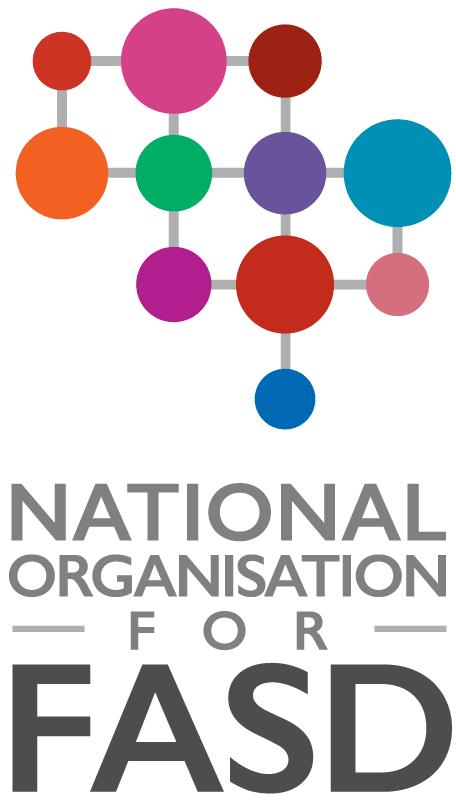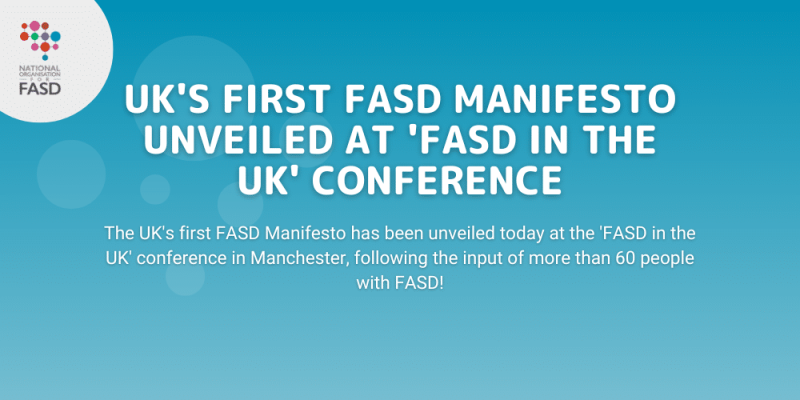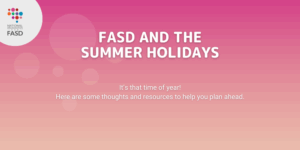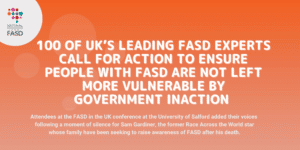Today, at the FASD in the UK conference in Salford, Manchester, the UK’s first FASD Manifesto has been unveiled. The Manifesto was created with the direct input of more than 60 people with FASD, and is a guide for those who work with people with FASD.
It communicates, in the words of people with FASD, how they would like to be treated by others around them. The information was collected partly by the use of a survey, and partly by direct, creative input from people with FASD from across the UK.
The Manifesto is designed to act as a reference document for professionals working with people with FASD and other additional needs, who are often side-lined in their own care.
You can download your own copy using the button below.
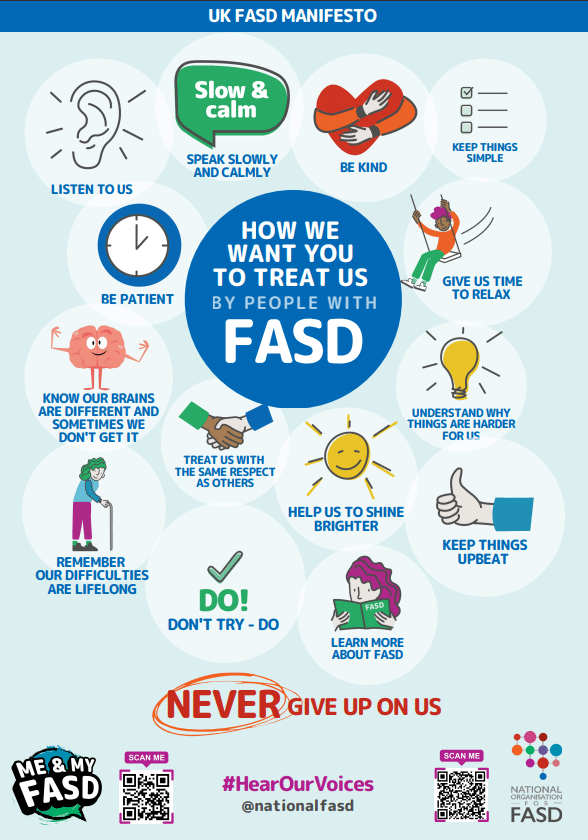
Created with input from people with FASD
Check out this podcast featuring the voices of Dom, Rachel, and Jacob, three young adults with FASD, where they outline the UK FASD Manifesto project.
After this initial chat on 25 November 2022, we summarised the main points and then opened discussion up via Survey Monkey.
Finally, we put it all into the poster and animation you see above, that were also reviewed (and narrated) by people with FASD. Every word in the animation and poster came from people with FASD.
In a release to media, Sandra Butcher, National FASD’s Chief Executive said, “At a time when mandatory training for autism and learning disabilities is being rolled out as a result of the Health and Care Act, and when the Department for Education has launched its new Special Educational Needs and Disabilities (SEND) and Alternative Provision (AP) Improvement Plan, we are pleased Government are taking some steps to meet the needs of some of society’s most vulnerable.”
“But they are limiting their impact and wasting funds by gatekeeping these services and schools only for those with autism and learning disabilities. This definition excludes other neurodevelopmental conditions and too often leaves out those with lifelong brain damage caused by alcohol-exposed pregnancies but who don’t meet typical definitions of learning disabilities.”
A group of young leaders with FASD is presenting the Manifesto at the conference. They are hoping to change the way society treats people with FASD.
“As an adult with FASD, I wish people would understand me and treat me with the same respect as they do for people with other conditions.”
Claire McFadden Tweet
“People with FASD have a right to support from medics and teachers who take the time to understand us and our disability.”
Georgia Roberts Tweet
“People with FASD should be treated equally. Remember that it’s a brain-based condition and not wilful behaviours, it’s symptoms of our condition.”
Paula McPhail Tweet
“People with FASD are like everyone else. We want people to be kind to us and to be patient. Understanding and believing that FASD is a lifetime disability is most important. Educators need to arm themselves with lots of knowledge about it in order to understand us.”
Bailie Jordan-Collins Tweet
“It’s so important that doctors and teachers listen to people with FASD. This manifesto is how we’d like them to support us. When we say we need help, even if it’s not verbal, just ask and talk to us, then we will tell you when we are ready. Medication and therapy aren’t always the answer.”
Rachel Jackson Tweet
A reference document for professionals
The manifesto calls on a wide range of professionals to “remember, just because you can’t see our disability doesn’t mean we don’t have one” and to “understand why things are harder for us.” It says, “We are sick of people saying they understand, or that they are trying to help, but they do nothing.” A poster summarising the manifesto, intended for display throughout the NHS, features key themes such as, “listen to us,” “speak slowly and calmly,” “remember our difficulties are lifelong,” “know our brains are different and sometimes we don’t get it,” and “never give up on us.”
“It’s critical that we listen to the voices and experiences of people with FASD as we begin to ramp up services across the UK following on from the NICE Quality Standard on FASD. This manifesto should be a great starting point for every discussion any professional has when supporting a person with FASD.”
Prof Raja Mukherjee, Consultant Psychiatrist and FASD Service Lead Tweet
“This FASD Manifesto is the first of its kind in the UK, and we hope to see it shared as widely as possible, particularly amongst those who work with people with FASD and other additional needs. People with FASD and indeed other conditions tell us they are often spoken down to or do not have their communication needs addressed properly. This can cause an array of issues. By asking people with FASD directly how they would like to be treated, we can establish the best possible basis for effective and supportive communication.”
Dr Patricia Jackson, Paediatrician, SIGN-156 co-chair, National FASD Trustee Tweet
The UK FASD Manifesto is part of National FASD’s “Me and My FASD” project that was originally funded as part of a partnership with Seashell by the DHSC. This project serves as a bridge to the “Rising 18+” project for which we are actively seeking funding. The Rising 18+ project will raise the voices of those with FASD on the needs of people with FASD as they transition into adulthood. A version of this post is available for children and young people with FASD at www.fasd.me.
National FASD is co-sponsoring today’s FASD in the UK conference, alongside the University of Salford, where the conference is being held, FASD Greater Manchester, and NHS Greater Manchester. This year, the event is dedicated to celebrating the last 20 years of progress in FASD in the UK. Click here to learn more about the conference and see the agenda.
In the last two years alone, we saw the release of the DHSC FASD Health Needs Assessment, the NICE Quality Standard on FASD, followed by our own report, The Time is Now, which builds on these ground-breaking changes to help offer practical ways forward and is already in use up and down the UK.
As well as reflecting, the conference is designed to help us collectively inspire progress for FASD in the UK. Change is coming!
Make sure to stay tuned to our social media for updates throughout the day.
Update! Georgia briefed the Health Secretary Steve Barclay about the Manifesto!
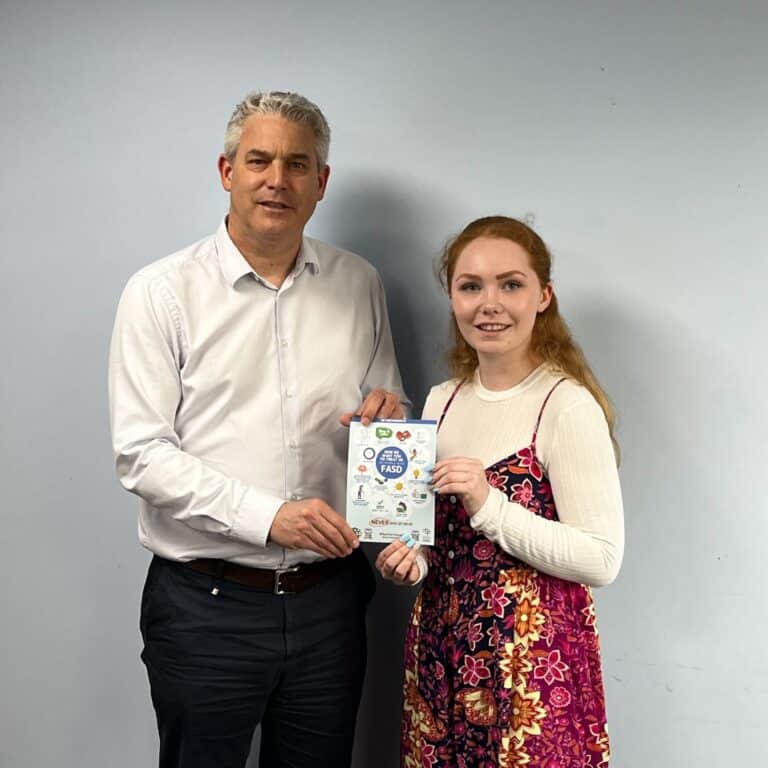
Georgia is a young adult with FASD. She met her MP and the Secretary of State for Health and Social Care, Steve Barclay, and presented him with copies of the UK FASD Manifesto.
She also talked to him about the challenges faced by people with FASD as they turn 18 and become adults.
Georgia said: “It was really good to spend 40 minutes talking to Steve Barclay about how FASD has affected me and what needs to be done […] to support people with FASD. He was very genuine and interested in what I had to say to him.”
